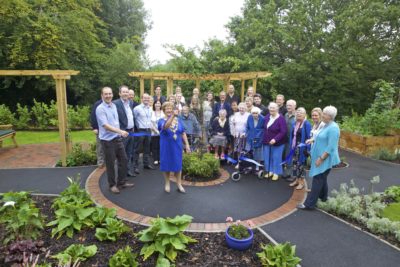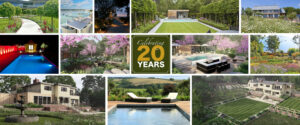JPS CELEBRATES WITH THE MAYOR OF POOLE

The official re-launch of Belmont Court, a PHP extra care scheme in Parkstone, took place last week as the whole JPS team, residents, volunteers, contractors and the Mayor of Poole Cllr Anne Stribley joined the Developer PHP to celebrate all the building works and changes that have happened there over the last two years.
Belmont Court was originally a home for the blind, built around the 1900s. It later became sheltered housing and was extended in the 1980s. By 2010, the building was in desperate need of a makeover, so PHP set to work with plans to make the place more welcoming and suitable for the 38 residents who call Belmont Court ‘Home’.
There have been several phases of work to bring Belmont Court up to ‘extra care’ standard. Much of the work has involved improving the lighting, functional decorations and flooring, making the building sustainable through solar panels, installing intelligent heating, a new lift… and, last but not least, building the sensory garden.
The garden was designed to provide stimulating experiences for the residents and to enable wider use, enjoyment and links to nature through the outside space. Planting was designed to provide colour, scent, biodiversity and encourage wildlife while providing a pleasant place to walk around and relax in. There is even a section for the keen vegetable growers, which is already producing food, a BBQ area, plenty of seating, and a large summer house.
The whole process could not have gone ahead without the help and support of a wide range of people and suppliers, most of whom donated their own time to volunteer or to provide services at reduced rates to help PHP achieve their goal.
JPS and DMWA Architects designed the gardens and planting schemes. They also joined in to help with some of the digging work. With PHP’s modest budget and some successfully secured Health and Well-being Legacy funding (thanks to their Community Involvement Officer, Claire), materials and plants were purchased. Contractors were used to install the level-access paths and to complete the heavy landscaping work. Volunteers helped to instate virtually all of the planting and to build the summer house, seating, arches and pergolas.
Ryan Martin, Director at DMWA commented, “After producing concept sketches, we contacted JPS to see whether they would be interested in developing the soft landscape aspect of the design. The landscape was designed to promote wildlife and offer residents with conditions such as dementia, physical disability and visual impairments the opportunity to enjoy a new lease of life in a considered garden environment. In order to meet the needs of the users, the plan encompasses a circuitous walkway route that is fully accessible by motorised wheelchair. Planting species were selected to encourage wildlife, create architectural features, grow vegetables, provide scent and grow in site specific environmental conditions”.
Working closely with the client and JPS, DMWA and the whole team helped to bring about a successful and well-used garden for all the residents. Jon-Paul Elwart from PHP is delighted with the final result.
“The residents and local volunteers have also helped with watering, planting, mulching and weeding, and now I am very happy to hand it over to them to enjoy. The building works we have carried out will improve the residents lives and the care we can give them. However, it is even more rewarding to be able to build the garden, as it is clear from my time there that the garden is what really excites everyone! Hopefully it will grow and evolve into something even better as they add to it and make it their own.”
Melissa King, Care Sector Specialist at JPS, commented after the launch; “JPS recognises the importance of providing the highest quality, tailored, long-term support for helping those in need of a beautiful and functional outdoor space. Whether this is an area for a keen gardener to explore their hobby in an easy and practical way, or through a window with an ever-changing view to delight the senses from the comfort of the indoor environment. We always encourage the residents of the care home or organisation to be involved in the design process; to allow for their thoughts and ideas and to help create a sense of belonging and ownership of the garden space. We also recognise the importance of clearly understanding the brief of each care home or organisation – and helping them to fully utilise the space to their specific requirements and always ensure our solutions don’t add to workloads, but are viable in every way”.

